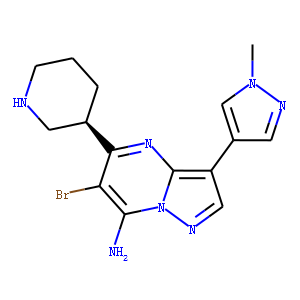<p style=/line-height:25px/>SCH900776 is a potent, selective and orally bioavailable inhibitor of checkpoint kinase Chk1 (IC50 = 3 nM), highly selective against Chk2 (IC50 = 1500 nM) and cyclin-dependent kinase CDK2 (IC50 = 160 nM).<br>IC50 Value: 3 nM(Chk1)<br>Target: Chk1<br>in vitro: SCH 900776 is a less potent inhibitor of Chk2 and CDK2 with IC50 of 1.5 μM and 0.16 μM, respectively. SCH 900776 shows no significant inhibition of cytochrome P450 human liver microsomal isoforms 1A2, 2C9, 2C19, 2D6, and 3A4. SCH 900776 induces a dose-dependent loss of DNA replication capability 24 hours after hydroxyurea exposure. SCH 900776 enhances the γ-H2AX response of hydroxyurea, 5-fluoruracil, and cytarabine. In combination with an antimetabolite, SCH 900776 induces accumulation of γ-H2AX within 2 hours, indicative of replication fork collapse and double stranded DNA breaks. Additionally, SCH 900776 suppresses accumulation of the Chk1 pS296 autophosphorylation in a dose-dependent manner. Exposure of proliferating WS1 cells to SCH 900776 is associated with rapid, dose-dependent accumulation of Chk1 pS345, indicating that cycling populations of normal cells induce Chk1 pS345 following exposure to SCH 900776 as part of a futile cycle, perhaps driven by AT-family kinases and DNA-PK.<br>in vivo: Administered 30 minutes after gemcitabine, 4 mg/kg SCH 900776 is sufficient to induce the γ-H2AX biomarker while 8 mg/kg leads to enhanced tumor pharmacodynamic and regression responses relative to gemcitabine or SCH 900776 alone. Dose escalation of SCH 900776 (16 mg/kg and 32 mg/kg) induces incremental improvements in tumor response. Importantly, doses of SCH 900776 associate with robust biomarker activation and improved tumor response are not associated with enhanced toxicity of gemcitabine on hematological parameters in BALB/c mice.<br>SCH900776 exposure phenocopies short interfering RNA-mediated CHK1 ablation and interacts synergistically with DNA antimetabolite agents in vitro and in vivo to selectively induce dsDNA breaks and cell death in tumor cell backgrounds. Chk1 inhibitor SCH 900776 abrogates cytarabine-induced S-phase arrest and enhances cytarabine cytotoxicity in acute leukemia cell lines and leukemic blasts in vitro.</p>

